Ferrets
5 Common Causes of Ferret Hair Loss
One of the most common health problem a ferret can have is hair loss. The correct medical term for hair loss or baldness is alopecia. It means that there is a partial or even a complete hair loss in an area that has hair. The locations of the hair loss area differs from each other depending on what causes alopecia on the first place.
1. Hormonal Hair Loss In Ferrets
Each year ferrets will shed their hair twice for their seasonal shed. During springtime, the ferrets will shed off their thick winter coat and have their thinner summer coat in order to avoid overheating during summer time.
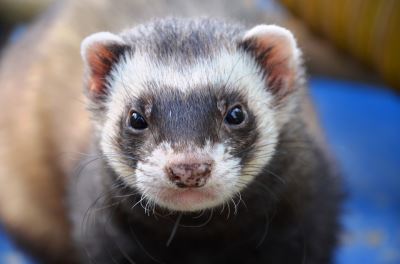
And during fall, you’ve guessed it, they will shed off their thin summer coat and put on their thick winter coat in order to keep themselves warm during winter time. The normal shedding time usually takes around 2 to 3 weeks to accomplish.
Female and male ferrets that are not spayed or neutered will also shed a lot during their breeding season which is around spring and summer.
2. Adrenal Gland Disease
This is the most common cause of ferret hair loss. A lot of ferrets suffer from this disease alone. This problem is age related and usually happens around middle-aged to older ferrets. If this disease happens to your ferret, their adrenal glands will overproduce sex hormones that causes hair loss to the ferret. The hair loss starts from the tail and work its way up to the rump and alopecia will expand until it reaches the head. But this pattern of hair loss is not the same in all adrenal gland disease. Other ferrets might have a different pattern.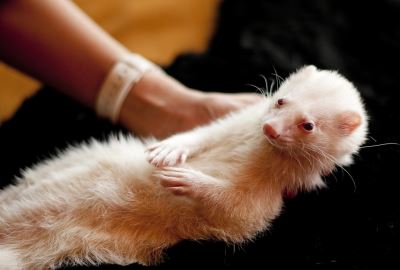
This disease can be easily diagnosed in most cases. The veterinarian will diagnose your ferret based on their physical test. Some vets will also test the ferret’s blood in order to measure their hormone levels. This disease can be treated either by medicine or by surgery. The best thing to do is to consult your vet on which is good for your ferret.
3. Ferret Rat Tail
Another kind of hair loss is the ferret rat tail in which the ferret will lose all their tail’s hair and will look like a tail of a rat. This is a very common alopecia that targets male ferrets during breeding season. Some ferrets that have been neutered and spayed can still have this hair loss.
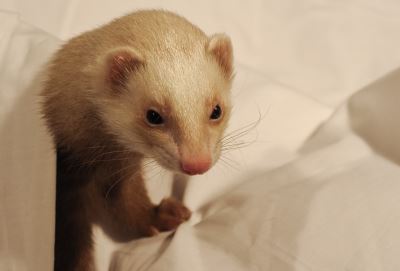
Most of the time the hair will just return during the next seasonal shed. The ferret rat tail is also an early sign of adrenal gland disease. If ever your ferret shows this hair loss, better consult your veterinarian for the proper treatment.
4. Parasites
If your ferret usually spends a lot of time outside then it is possible that it has pick up some fleas from other animals outside. These ear mites and skin mites and fleas causes hair loss in ferrets. With their constant scratching on the area infested by the parasites, the ferret will lose hair in that affected area.
Regardless of the ferret breed, fleas usually affect the hair loss around the shoulder and neck area. If your ferret keeps on scratching that area, better check for fleas. You can easily treat fleas by using anti flea products. It is better to consult your veterinarian for what is the best anti flea product is best for your little buddy.
Ear mites is commonly found at (you’ve guessed it) ears area. The constant scratching around the ear of the ferret will result in hair loss in that area. And again there are products that are good for getting rid of these ear mites, but it is better to consult your veterinarian for the best product that he can recommend.
5. Infections
Infections that causes hair loss to ferrets are not very common but are usually caused by ringworm, yeast and bacterial infections.
Ringworm infection is can be acquired from a cat or kitten that has been infected. Small patches of hair loss are often found in the ferret’s body if he infected by this. The veterinarian will examine if your ferret is infected by the ringworm, and if it turns out positive, the ferret can easily be treated by medications used by the cat and kittens.
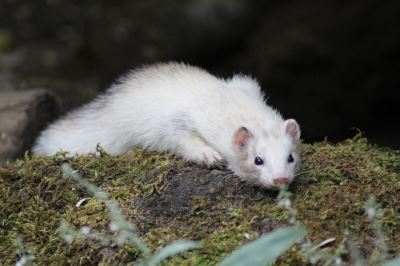
Yeast infections are not common to ferret but if the ferret acquires this, it can usually be found on old ferrets that has either adrenal gland disease or cancer. The area affected by hair loss will have a crusty appearance on the ferret’s skin. This infection is often found in the face of the ferret. This infection can be treated by medications that are used by dogs but it is also a good idea to consult your veterinarian first.
The last infection that causes hair loss is the bacterial infection. This is very uncommon to ferrets. This infection will cause the ferret to scratch excessively on the shoulder of the affected area which causes hair loss. But this can be treated by antibiotics. Always remember to consult your veterinarian before buying the medications.
Now, before you even take action against ferret hair loss, it is best that you have a sturdy ferret cage that will serve as a temporary resting place.
Image Sources: [1] [2] [3] [4]



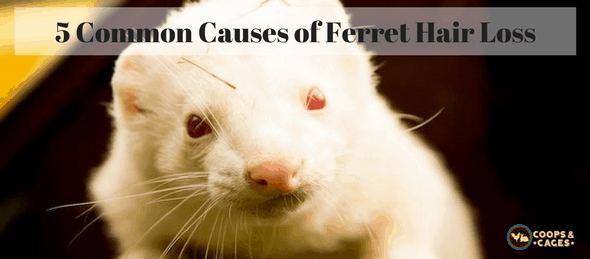
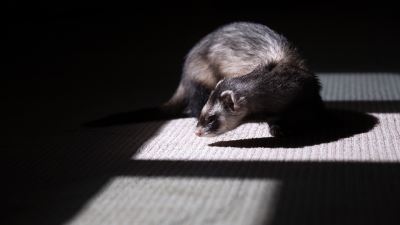
my ferret has a single spot on his upper back that he is pulling out the hair or it is falling out and he has loss some weight however he is eating well and remains active any suggestions would be helpful. I do keep cage clean and provide fool at all time and he eats welll. please help
My male ferret has been struggling with is coat for a while. He has the same diet and everything as our female ferret who has a very thick and healthy coat. He’s never gone completely hairless but currently has a balding spot on his back and thin hair everywhere but his face and hips. He seems to be acting normal besides some itching. It doesn’t quite match up with the adrenal gland disease as its more spotty and isn’t working its way up the tail. I think it may be because of seasonal shedding (currently January) but he’s never had a super thick coat like our other ferret. We don’t have a ferret vet near by and covid makes us hesitant to go in general or to travel to a vet that takes ferrets. Anyone else have a similar sounding experience?
My female ferret had a similar problem. Her coat wasn’t as thick or nice as our male ferrets coat is, but she’s always had a thinner coat than him. Then she started getting patches of hair loss, and she was overly itchy (she’s always been a bit itchy). I took her to the vet and he said she had adrenal, I wasn’t convinced, I thought it might be allergies to a new kind of food, but I had the vet give her the injection anyway. After her first injection not much seemed to change, but after her second injection her coat got much better. I went in a little late for the second injection because I still wasn’t convinced it was adrenal, but within weeks of missing it she started having bald patches again, worse than before. After her second injection her coat recovered really quickly, and now she has such a nice thick coat. I don’t think I’ve ever seen her with a coat so nice, at least not for a couple years now. Adrenal doesn’t present the same for every ferret, and itching with bald patches from scratching is still a symptom of adrenal. After a couple injections you should know for sure.
My ferrets in her 1st season and has been paired with a male she’s come home very droopy and is losing hair on her tail, I’m thinking stress and alepicai does anyone have any ideas as to wat I can do
My favorite has one little patch missing on the left side it’s not adrenal disease and she doesn’t have boring worms and she doesn’t have mites I can’t put my finger on what is causing her to lose her hair